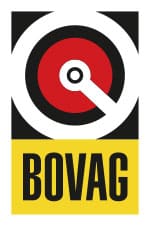Can you fit a tow bar to a double cab?
Yes, you can fit a towbar to a double cab without any problems. These commercial vehicles are technically suitable for this, provided you take into account the tow weight allowed and choose the right tow bar to suit your specific model. The fitting itself can be carried out by a specialist, after which the towbar will be registered in the registration number. So you can safely use trailers, semi-trailers or bike carriers for your business activities.
What types of towbars can you fit to a double cab?
There are three main types of towbars that you can put on a double-cab van can fit: the fixed towbar, the removable towbar and the gooseneck towbar. Each type has specific advantages and suits different usage situations. The fixed towbar always remains visible, the removable one can be removed when not needed, and the gooseneck one offers extra stability for heavier loads.
The fixed towbar is the simplest and often cheapest option. It stays permanently under your commercial vehicle and is always ready to use. This type is ideal if you regularly tow trailers or use a bike carrier. The downside is that it always remains visible, which some people find less neat and which reduces ground clearance slightly.
A detachable tow bar offers more flexibility. You can easily remove the tow ball when not in use, making your commercial vehicle look neater and maintaining full ground clearance. This type is popular with business owners who occasionally tow a trailer but don't always want to see a tow bar. Installation does cost a little more than a fixed variant.
The gooseneck tow bar is mainly used for heavier trailers and offers the best stability when towing larger loads. This type is often chosen by construction or transport companies that regularly transport heavy machinery or materials. Although the gooseneck is more expensive to buy and fit, it offers maximum pulling power and safety.
What is the cost of fitting a towbar on a double cab?
The total cost of fitting a towbar consists of several components: the purchase price of the towbar itself, fitting costs, any modifications to the electrical system and the cost of inspection and registration. You will pay less for a fixed towbar than a detachable one, while a gooseneck is usually the most expensive. The electrical installation with a 13-pin plug costs more than a 7-pin version.
The purchase price of the towbar varies depending on the type and make of your commercial vehicle. A fixed towbar is usually the most affordable option, followed by the detachable variant. A gooseneck towbar is in the higher price range. Make sure you choose a towbar specifically designed for your double cab model, as not every towbar will fit every vehicle.
The assembly costs depend on where you have the towbar fitted. A specialist garage or towbar specialist usually charges a flat fee for fitting, including connecting the electrical system. This work must be done expertly to ensure safe towing. Some companies offer packages where the towbar comes with fitting included.
For the electrical installation you have the choice between a 7-pin and a 13-pin plug. The 7-pole plug is suitable for basic lighting on a trailer, while the 13-pole plug also provides power for additional functions such as a fridge in a caravan. For business use, the 13-pole is often more convenient as you have more options.
After mounting, the tow bar must be inspected and registered at the RDW. This incurs extra costs, but is mandatory to legally drive a trailer. The inspection checks that the towbar is correctly fitted and safe. Only after approval will the towbar be entered in your registration certificate.
How does the installation process of a towbar work and do you have to inspect it afterwards?
The installation process starts with choosing the right towbar for your specific double cab model. Next, the towbar is mechanically attached to the chassis and the electrical system is connected to your commercial vehicle's system. After fitting, an inspection is mandatory, checking that everything is fitted safely and according to the rules. The towbar is then registered with the RDW and appears in your registration certificate.
The first step is the selecting the right towbar. Not every towbar will fit every double cab, so you need a variant developed specifically for your make and model. A specialist can advise you on this based on your commercial vehicle's registration number. The desired towing weight also plays a role in the choice.
The mechanical assembly is done by securely attaching the tow bar to the chassis of your commercial vehicle. This should be done at specific mounting points designated by the manufacturer. A skilled mechanic will ensure that all bolts are correctly tightened and that the tow bar is stable. This is important for safety while towing.
The electrical installation is connected to your double cab's electrical system. Modern commercial vehicles often have preparation for a tow bar, which makes installation easier. The electronics ensure that the lights on your trailer work and that the vehicle detects when a trailer is hitched.
After assembly, a inspection mandatory. You have to go to an approved inspection station where it is checked that the towbar is fitted correctly and meets all safety requirements. Without this inspection, you cannot legally drive a trailer. The inspector checks the attachment, electrical operation and towing weight.
The registration process at RDW takes place after a positive inspection. The tow bar is then officially listed in your registration certificate, including the maximum tow weight. This is important for insurance and police checks. You receive a new registration card on which the tow bar is registered.
What should you pay attention to when it comes to the towing weight of a double cab?
The towing weight is the maximum weight you can tow with your double cab. There is a difference between the braked and unbraked towing weight. The braked towing weight applies to trailers with their own brakes and is much higher than the unbraked towing weight. You can find this information in your registration certificate. Note that the load in your cargo space affects the remaining towing weight you are allowed.
The maximum towing weight braked is the weight you are allowed to tow with a trailer that has its own brakes. This is usually between 2,000 and 3,500 kilograms, depending on your specific double cab model. The braked towing weight is always higher than the unbraked towing weight because the trailer's brakes help with braking.
The maximum towing weight unbraked applies to trailers without their own braking system. This is usually around 750 kilograms. Small trailers for garden waste or light materials often fall into this category. It is important to know this difference, as using the wrong towing weight can be dangerous and cause problems with your insurance.
You'll find it Permitted towing weight in your registration certificate under the codes O.1 (braked) and O.2 (unbraked). These details are also listed on the type plate of your commercial vehicle. Always check this information before buying or renting a trailer. That way you can be sure you stay within the permitted limits.
The cargo in your cargo space directly affects the remaining towing weight. If your commercial vehicle is heavily loaded, the weight you are still allowed to tow reduces. This is because there is a maximum permissible total weight for the combination of vehicle, load and trailer. So always calculate how much you are allowed to load and tow in total.
Practical examples: with an average double cabin you can usually pull a trailer with building materials, a boat trailer or a horse trailer. Heavier machines on a flatbed trailer require more towing power and are not always possible. Always check that you stay within the limits for safety and to avoid problems with your insurance.
How Van Den Hurk helps with towbars on double cabs
At Van Den Hurk, we understand that for many entrepreneurs, a towbar is a practical addition to their double cab. We are happy to help you with personal advice on which towbar is best suited to your specific vehicle and usage situation. Whether you regularly tow heavy trailers or occasionally use a bicycle carrier, we think along with you about the best solution.
Our support includes:
- Advice on suitable towbars for the specific models in our stock, so you know which type best suits your operations
- Information on assembly and installation through reliable partners who deliver expert work
- Assistance with testing and registration so that your towbar is correctly recorded in your registration certificate
- Possibility of buying a double cab with mounted towbar, so you can hit the road straight away
With over 60 years of experience in commercial vehicles, we know what is involved in equipping a van double cab with a towbar. We ensure transparency in costs and options, so you know exactly where you stand. Do you have questions about towbars or want to know what options are available for your van? Contact us for personal advice or drop by our showroom in Helmond. We will be happy to help you find a suitable solution for your company.





